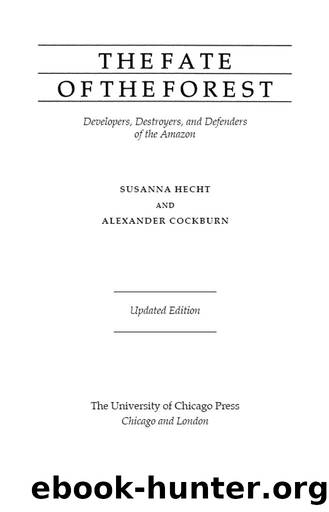The Fate of the Forest: Developers, Destroyers, and Defenders of the Amazon, Updated Edition by Susanna B. Hecht & Alexander Cockburn

Author:Susanna B. Hecht & Alexander Cockburn [Hecht, Susanna B.]
Language: eng
Format: azw3
ISBN: 9780226322735
Publisher: University of Chicago Press
Published: 2011-01-14T16:00:00+00:00
NINE
The Ecology of Justice
The forest is one big thing; it has people, animals, and plants. There is no point saving the animals if the forest is burned down; there is no point saving the forest if the people and animals who live in it are killed or driven away. The groups trying to save the race of animals cannot win if the people trying to save the forest lose; the people trying to save the Indians cannot win if either of the others lose; the Indians cannot win without the support of these groups; but the groups cannot win without the help of the Indians, who know the forest and the animals and can tell what is happening to them. No one of us is strong enough to win alone; together, we can be strong enough to win.
PAIAKAN, Kayapó leader to Terry Turner, Cultural Survival
From the moment the Amazon was opened to the Old World, it was embraced with widely varying expectations. As we saw at the start of this history, some nourished hopes for the Amazon as an Eden under glass; some as a treasure-house of gold and kindred blessings; others as the invitation to a march of national destiny.
We have tried to show that there are many dreams of the Amazon but the reality is often forgotten. The struggle over the region’s future is fundamentally about justice and distribution; whether the Amazon becomes both a literal and moral desert – a land of exterminated Indians, evicted forest people, swollen urban slums and million upon millions of acres of degraded pasture and poisoned rivers.
The forces propeling this destruction are not irrational. Explanations that focus on the supposed ignorance of the actors or on short-sighted planning miss the reality: there was money to be made; survival to be sustained in clearing forest. These have been processes with a logic and trajectory deeply embedded in the region’s political and economic history. Despair has also fed these processes of environmental destruction – the small peasant desperate for land who clears his five acres a year; the goldminer who leaches mercury into the streams as he refines out his nuggets – and this despair must be set in the context of agrarian and political history, and the wild swings of Brazil’s economy over the last twenty-five years, which have systematically increased the already vast distance between the relatively few rich and the innumerable poor.
When the generals began their project of ‘flooding the Amazon with civilization’, as General Golbery put it, they had no idea of the environmental holocaust they were about to unleash. They viewed their enterprise as an orderly military occupation – indeed General Castello Branco described it in just those terms. When crises peaked, as they often did, the military were close at hand with short-term solutions ranging from repression to ad hoc agrarian reform in order to appease the increasingly intractable rural populations. But, as we have described in episode after episode of Amazonian history, both the social and the natural terrain have rarely respected such orderly ambitions.
Download
This site does not store any files on its server. We only index and link to content provided by other sites. Please contact the content providers to delete copyright contents if any and email us, we'll remove relevant links or contents immediately.
| Africa | Americas |
| Arctic & Antarctica | Asia |
| Australia & Oceania | Europe |
| Middle East | Russia |
| United States | World |
| Ancient Civilizations | Military |
| Historical Study & Educational Resources |
The Light of Days by Judy Batalion(828)
Stalin's War: A New History of World War II by Sean McMeekin(688)
Walk in My Combat Boots by James Patterson(614)
The Pacific War 1941-1943 by James Holland(611)
Victory's Price (Star Wars) by Alexander Freed(580)
The Vietnam War: An Intimate History by Geoffrey C. Ward & Ken Burns(570)
First Platoon: A Story of Modern War in the Age of Identity Dominance by Annie Jacobsen(566)
Cold War (Alexander King Book 2) by Bradley Wright(558)
The American War in Afghanistan by Carter Malkasian(557)
Operation Pedestal by Max Hastings(542)
Blood and Ruins: The Great Imperial War, 1931-1945 by Richard Overy(531)
The Madman Theory by Jim Sciutto(522)
Concepts of Space by Jammer Max;(520)
Extreme Fitness by Chris McNab(515)
World War II Infantry Fire Support Tactics by Gordon L. Rottman(504)
Flying Tiger by Samson Jack(501)
Pathfinders by AL-KHALILI JIM(497)
Panzerkrieg by Mike Syron(490)
Hitler’s Pre-Emptive War: The Battle for Norway, 1940 by Henrik O. Lunde(484)
